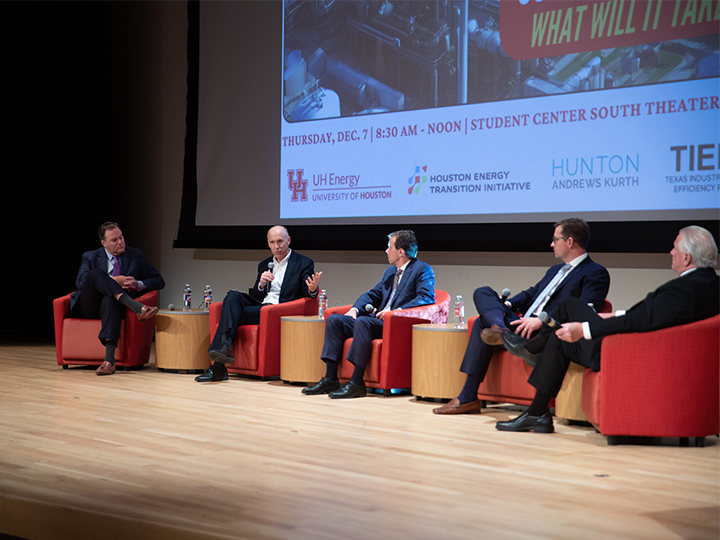Carbon capture, utilization and storage (CCUS) is considered essential to the energy transition, and technologies and businesses will be tasked with reducing emissions enroute to a future with reliable, sustainable and affordable energy. The University of Houston’s Center for Carbon Management in Energy (CCME) as well as the Division of Energy and Innovation hosted a timely symposium, titled “CCUS Commercial Deployment: What Will It Take to Make It Happen?,” to explore the infrastructure, electricity, geological and water challenges along with workforce and supply chain considerations in Houston and the surrounding region.
Attended by representatives of academia and industry, as well as future decision-makers, the symposium centered on a white paper, “CCUS Infrastructure: Preparing for the Future of Houston,” commissioned by the Houston CCS Alliance and the Houston Energy Transition Initiative. The paper shares numerous scenarios geared toward achieving net-zero goals. Additionally, panelists discussed real-world success stories and lessons learned on the road to broad commercial CCUS deployment.
“We hope this can be something foundational to [the energy industry’s] strategic planning, its view of the future and the alternatives associated with it,” said Charles McConnell, energy center officer at CCME and lead author of the white paper. “CCUS, without pipeline infrastructure and the ability to do it, is not going to be commercially deployed. Every company (in the CCS Alliance) has an oar in the water in terms of making it happen.”
Noting CCUS as an essential tool for the large-scale decarbonization required for the energy transition, McConnell said that Houston’s geographical and technical advantages allow it to be the epicenter of CCUS advancement.
“We have a really unique ecosystem here in our region, and shame on us if we don’t take advantage of it,” McConnell said. “Those industries are going to lead this conversation, and we’re all going to be a part of that effort, including the University of Houston. We’re the Energy Capital of the World, and we’re proud to say it, but aside from the demonstration project at Petra Nova, we’re not capturing anything. The challenge is going from what we understand and what we know we can do to realizing it. We’ve got work in front of us, and we need to get after it.”
McConnell’s overview of the white paper was followed by a pair of panel discussions. Firstly, a case study took place of ongoing construction of ADM’s first-of-its-kind power and steam facility in Decatur, Ill. The panel, moderated by McConnell, included Fred Eames, partner at Hunton Andrews Kurth; Jon Wiens, CEO of Warwick Carbon Solutions; Colin Graves, vice president of innovation at ADM; and Matt Murphy, senior consultant with Mac Strategies.
Led by Houston-based Warwick Carbon Solutions, the facility expects a CO2 capture efficiency of over 90%, with the potential to sequester more than two million tons of emissions annually. The facility also aims to serve as a model for other states with the needed infrastructure to follow on the road to decarbonization. The panel collectively agreed that education would be vital to establishing similar projects elsewhere.
“The work that companies like Warwick and ADM are doing to reduce emissions from carbon-producing industries is vital, and the public needs to know about it,” Eames said. “We’re not going to power the world with windmills and solar panels alone, but they are an important part of what we’re going to do for the future. What Warwick is doing is exactly the thing we’ve been waiting to see for 15 years. This is a groundbreaking development we’ve been waiting for.”
Discussion then pivoted to pipeline challenges. Panelists were Nic Medina, public and government affairs manager with ExxonMobil; Dan Cole, former executive with Denbury; Elizabeth Worrell, managing director and chief legal counsel with the Pipeline Contractors Association; Stephen Lee, EVP of E&C at Navigator CO2; and moderator Cindy Yeilding, director with Denbury and former senior vice president with BP America.
The dialogue echoed an accompanying white paper by UH Hydrogen Program Officer Paul Doucette and Mohan Vedala titled “Carbon Dioxide Pipelines: Role in Responding to Carbon Emissions.” The paper highlights community engagement, safety, policy and timing as key factors to consider as CCUS projects develop.
Medina noted that citizen buy-in was essential as part of the educational process and explaining the need for pipelines.
“Pipelines operate in the public domain. By their nature, they go through parks, forests, ranches and communities,” Medina said. “We need to engage effectively with those communities well ahead of announcing projects. Collaboration between the public and private sector is going to be indispensable.”
